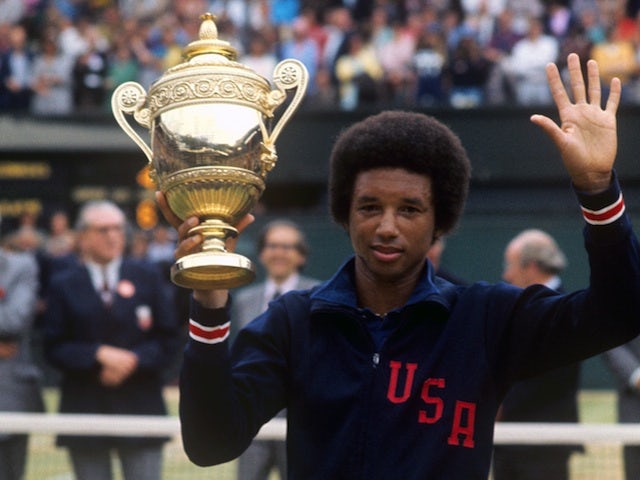Wimbledon's Centre Court has had its fair share of history. The roll of honour is decorated with names from all over the world and the crowds have been entertained by professional players since 1968 and amateur ones long before that.
However, the list of African-American winners at the All England Club - and indeed at all of the Grand Slams - makes up such a tiny fraction that what happened on July 5, 1975 is a momentous day in the history of black sport.
It is all the more incredible considering the task that Arthur Ashe, then 31, had ahead of him to write his name in the history books. His last Slam victory had come five years prior at the Australian Open and no-one had given him a chance on this day.
Why? He was up against a 22-year-old Jimmy Connors, the current holder of the title and a player who held three of the four majors. Many had said that he was unbeatable, that his power and speed would be too much for a player coming to the end of his career.
But no-one had told Ashe. He knew that his best chance of victory was to play an unpredictable, tactical game and not allow Connors to settle. He slowed the game down on serve and in rallies and used the full court to the best of his ability. Suddenly he was two sets up, taking both 6-1.
In the third set it appeared as though Ashe's young compatriot had worked him out. He battled back with speed and big serving to take the third set 7-5 and there was a sense that the momentum was going Connors's way. If he went on to take the fourth set, few would have looked past him to retain his trophy.
However, Ashe had been through too much in his life already to let a minor setback such as this affect him. He had fought for fair winnings for tennis players and had taken on apartheid South Africa after he was denied entry to the 1972 South African Open.
He used the narrow defeat in the fourth set not to change his style but rather to concentrate further on the play that had earned him the two-set lead earlier in the match.
Ashe clearly realised that he could learn more from the 6-1 6-1 start to the match than the 7-5 third-set loss and returned to his tactical duel. This was where the semi-final battle against Australia's Tony Roche came in most handy: he had got through that in five so could surely win this in four.
It did not come as quickly as the opening sets, but the guile of the sixth seed had paid off. He had become the first black man - and only the second person following Althea Gibson in 1958 - to claim the Wimbledon crown.
 © PA Photos
© PA Photos
"I always thought I would win because I was playing so well and was so confident," BBC Sport quotes Ashe as saying, with hindsight. Few, however, could argue that he had deserved it. And the scale of the victory can still be measured to this day; no black man has won at the All England Club since, and indeed only Yannick Noah has claimed any Slam.
Unfortunately, Ashe's health following the win at Wimbledon would see his career come to an end. He suffered a heart attack in 1979, which led to two bouts of heart surgery in four years and eventually in 1988 the discovery that infected blood from a transfusion had caused him to contract HIV.
Ashe died from AIDS-related pneumonia in 1993. However, his legacy lives on through the Arthur Ashe Foundation and the Arthur Ashe Stadium at Flushing Meadows in New York.









